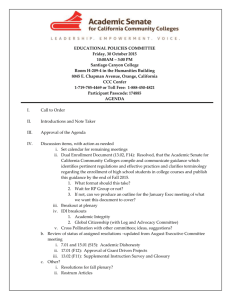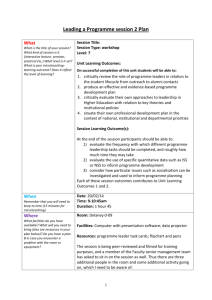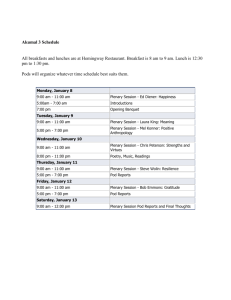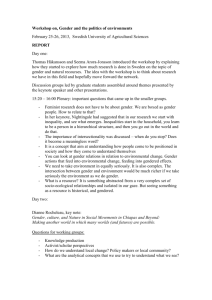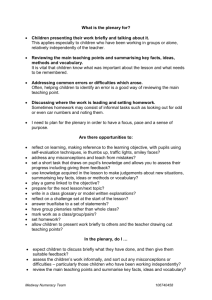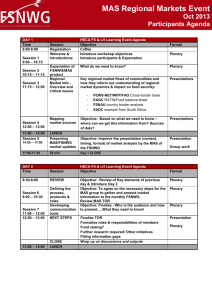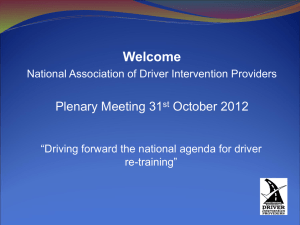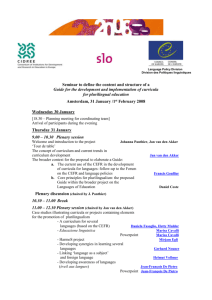25 ideas for increasing student talk in lessons.
advertisement
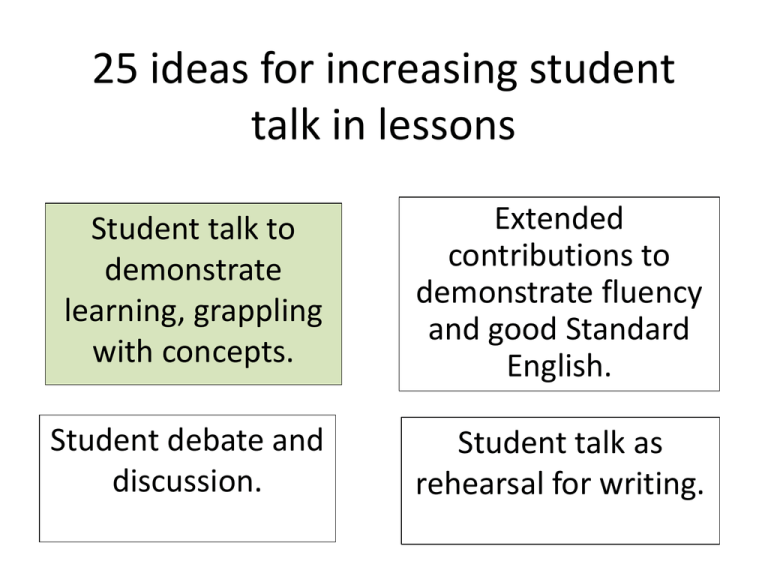
25 ideas for increasing student talk in lessons Student talk to demonstrate learning, grappling with concepts. Extended contributions to demonstrate fluency and good Standard English. Student debate and discussion. Student talk as rehearsal for writing. No pens lesson Does what it says on the tin. Students demonstrate all learning through talk. Don’t even bother with the title and aim. Describe it! (whole lesson) Show students a picture related to the topic. Ask them to give an extended description using key words, terms. Award points for length of contribution and the number of key terms used. What’s the link? (whole lesson) Give students a number of pictures or words and ask them to explain possible links. Gimme 5 (whole lesson) Extend students’ thinking by asking them to come up with 5 ideas / reasons / examples when they answer questions. Not just one. And another thing (whole lesson) Run along-side Gimme 5. Nominate students to be in charge of adding another idea. They have to add to what has already been said. The power of why (whole lesson) Simplicity itself. Every time a student gives an answer to a question ask them the question “why”. Variation – nominate students to be the kingpins of why – if someone in the class answers a question, they ask for more info by asking “why”. Question master (whole lesson) Similar to the Power of Why. Nominate students to be Question masters throughout the lesson. At any point, they can ask a question of the teacher or the rest of the class. Question starters might help. News broadcast (plenary) An old favourite. Students create a 1 or 2 min summary of learning in the style of BBC News. Class coach (whole lesson) A great pre-learning activity. Nominate a class coach – they are in charge of giving the class a pep-talk at the beginning of the lesson, reviewing learning half way through and summing up at the end. Conversion classics (plenary) Students verbally convert or recount information from the lesson into a different form. Ideas include a story, a rap, a poem, a motto etc. Just a minute (plenary) Like the radio programme of the same name, students are asked to attempt to talk on a given subject for a minute without, hesitation, repetition, deviation. Persevere with this one – once they get the hang of it they don’t stop talking! Walk and talk (plenary) Take students outside the classroom (or just around the classroom). Every time they change direction, they have change topic, share new facts or ideas. Visual talk (starter) Provide students with a drawing of the aim of a lesson. Get them to explain what they think they will be doing. Thinking talk (starter) Start your lesson with a thunk or a thinking starter. Allow students to share as many varied ideas as possible. Student teachers (whole lesson) Not to be confused with a class presentation. Students are asked to teach an idea/concept or series of facts they have learnt. They do this by providing activities for the class to complete – it could be a quiz, a game etc. Drama revision (plenary) Another old classic. Ask students to create a drama scene where they demonstrate a concept, an idea, a process or information. You could restrict groups or give varying instructions to add interest. Teacher no speak (whole lesson) A more high risk activity. An entirely teacher silent or partially silent lesson. Instructions are on the whiteboard and students have to ask and answer one another’s questions and queries to complete tasks. Taboo (plenary) An old favourite. Students have to get their team to guess a word by describing it, without using the prohibited list. Eg the word is apple. They cannot say apple, red, fruit, pie, cider or core. Helpline (whole lesson) Stand back to back One student rings the helpline where they ask for more information what they have learnt. The helpline has to explain the idea / concept or information. Being back to back is key as it focusses students on the words they are using. Not-clever-speak (plenary) Explain the concept or ideas from your lesson using none of the language or vocabulary you have learnt. Dictogloss Develops listening skills as well. Give students information verbally, then see how much they can remember straight away, after 20 mins and at the end of the lesson. Prove me wrong (whole lesson) Write a series of incorrect facts or assumptions about the topic. Students have to prove you wrong. Change it (whole lesson) This is a substitution or expansion exercise. Begin with a single simple sentence “the situation was unstable”. Get all the students standing up. Each student has to add words or substitute words to the previous sentence. You can provide them with help for lower ability groups such as “because”; “however”. Lesson commentary (whole lesson) Select 4-5 students who will act as lesson commentators. Allocate each of them one part of the lesson. Their job is watch everything that is going on and provide a 1 minute commentary at the end of the task. Spot the lie / Spot the truth Similar to radio / TV quiz shows. Students have to sneak one lie or one truth past their classmates. It can be played in teams or as a whole class. The lie or truth should be embedded in lots of information so it is less easy to spot. 50 questions in 50 minutes (whole lesson) Aim is to only ask questions during the lesson. Write 50 questions that will guide students through all the learning. Empower them by only asking questions and proving they can do the rest. Picture to draw (plenary) Ask students to devise a simple line drawing representing learning. They then need to describe how to recreate this line drawing to the rest of the class, without showing them the picture. This task focuses on instructions and clear explanations. Postcard home (plenary) Verbal version of the writing exercise. Students work in pairs to create a 20 word summary of the learning (use fingers to help keep track). KWL chats (whole lesson) Verbal version of the writing activity. Students discuss and explain: K - What do I know? W - What do I want to know? L - What have I learned? Who am I? (what/when am I?) Old classic. Give students a post-it note. They write a fact, a character, an item from the topic on it and stick on the forehead of another student. Students have to work out what their post-it note says by asking questions of the others around them.

